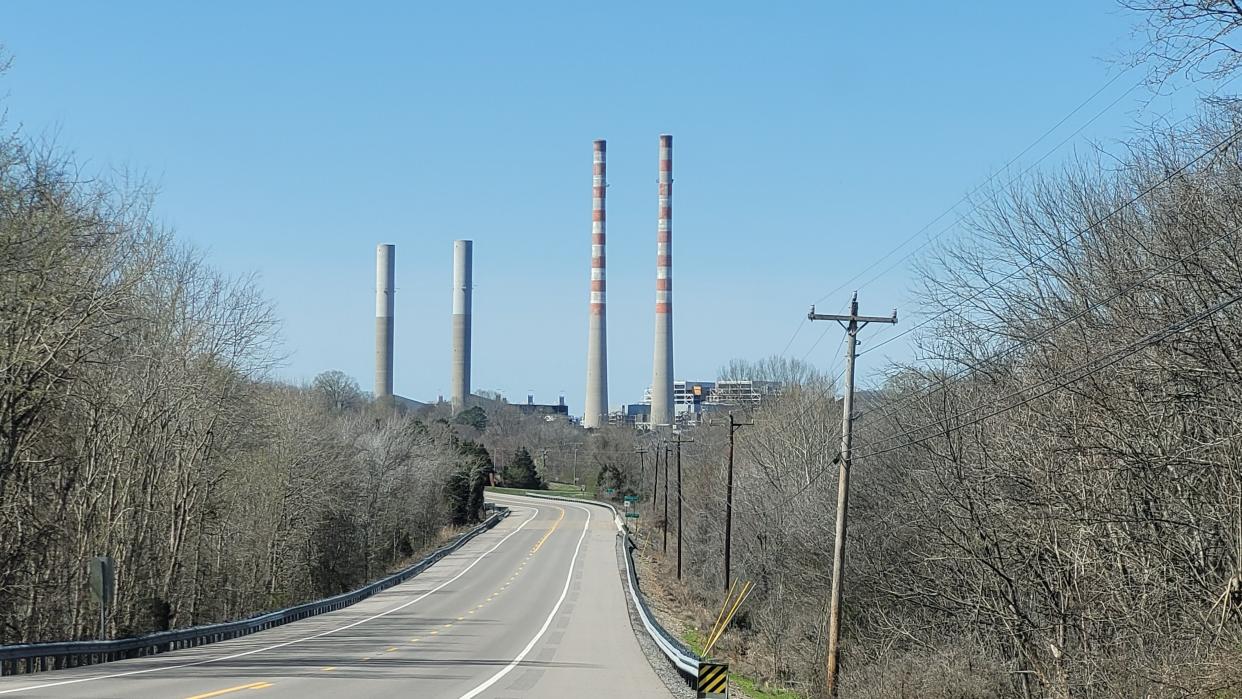TVA finalizes plan to transition Cumberland coal plant to natural gas

The Tennessee Valley Authority will replace its Cumberland coal plant with a natural gas facility, the federal utility formally announced Tuesday, over the objections of environmental groups.
The Cumberland City plant is TVA’s largest generator of electricity, powering 1.1 million homes. It consists of two coal-fired units: the first unit will be retired and replaced with a 1,450-megawatt combined cycle natural gas plant by 2026. The second unit will be retired by 2028. TVA has not yet determined how it will replace the second unit.
A new 32-mile natural gas pipeline through Dickson, Houston and Stewart counties will be built to supply the planned facility.
The transition will cut carbon emissions from the facility by up to 60 percent, TVA said. The utility has said it plans on achieving net zero carbon emissions by 2050. That effort will include retiring its final five coal plants by 2035.
The announcement follows a nearly two-year environmental review process in which environmental groups, the Department of Interior and the EPA criticized TVA for not meaningfully exploring other options, such as renewables like solar, to replace the coal plant.
Special report:Tennessee's power generation is cleaner than ever. The next step is a 'huge question'
Related:TVA chooses natural gas to replace the Cumberland coal plant
The announcement also follows a winter storm in which some of TVA’s coal and natural gas plants, including Cumberland, succumbed to cold weather, forcing the utility to implement rolling blackouts for the first time in its nearly 90-year history.
Still, TVA CEO Jeff Lyash said only natural gas can provide the reliable power needed to replace coal at the site.
“Replacing retired generation with a natural gas plant is the best overall solution because it’s the only mature technology available today that can provide firm, dispatchable power by 2026 when the first Cumberland unit retires – dispatchable meaning TVA can turn it off and on as the system requires the power,” Lyash said.
Environmental groups, EPA raise concerns
Environmental groups condemned the plan to replace coal with another carbon-emitting fossil fuel.
“Just a few weeks after failing fossil fuel plants caused rolling blackouts across its footprint, the Tennessee Valley Authority is recklessly plowing ahead with plans to spend billions on another dirty gas power plant,” said Amanda Garcia, director of the Southern Environmental Law Center’s Tennessee Office. “Instead of doubling down on fossil fuels, TVA must invest in clean energy sources that can reliably provide cleaner and cheaper power.”
Special report:Fighting fossil fuel with fossil fuel: How natural gas is winning TVA's plan to end coal
In response to concerns about the failure of some natural gas plants in December, Lyash said the plant the TVA plans to build at the Cumberland site will be more resilient than the ones that failed during December’s winter storm. He also pointed out that while some natural gas plants failed, the system also had zero solar energy available during the storm.
TVA is moving forward with its plan despite the federal Environmental Protection Agency declaring last week that it had “substantial” concerns about TVA’s final Environmental Impact Statement related to the Cumberland site.
Federal law requires TVA, a federal utility, to evaluate the environmental impact of shutting down a facility like Cumberland and evaluate possible replacements. The EPA found that TVA failed to properly evaluate alternatives like solar at the site, noting that “the alternatives analysis continues to rely on inaccurate underlying economic information.”
Cold weather:TVA takes 'full responsibility' for Christmas Eve power outages, rolling blackouts
Specifically, the TVA failed to account for expected declines in the cost of clean energy and increases in the cost of natural gas, EPA said.
TVA’s choice to replace coal generation with natural gas failed to address the “implications of continued fossil fuel investment for its ratepayers and the cost and public health toll of increasingly disruptive climate-driven weather extremes,” the EPA wrote.
In an interview Tuesday, Lyash said the TVA had worked to address the EPA’s comments. He also said the environmental review process was limited to the Cumberland site, and failed to address changes TVA was making across its system.
“Many people want to look at the EIS and ignore that over here we’re building thousands of megawatts of solar and over there we’re issuing a 5,000-megawatt clean energy RFP,” Lyash said.
The natural gas plant at the Cumberland site will be able to run on hydrogen fuel, or a mix of hydrogen and natural gas, if that technology becomes viable in the coming years, Lyash said. Likewise, the plant will be built so that carbon capture technology can be integrated into the system if that technology matures and becomes cost-effective.
Reach Josh Keefe at jkeefe@tennessean.com.
This article originally appeared on Nashville Tennessean: Tennessee Valley Authority to replace Cumberland coal plant

